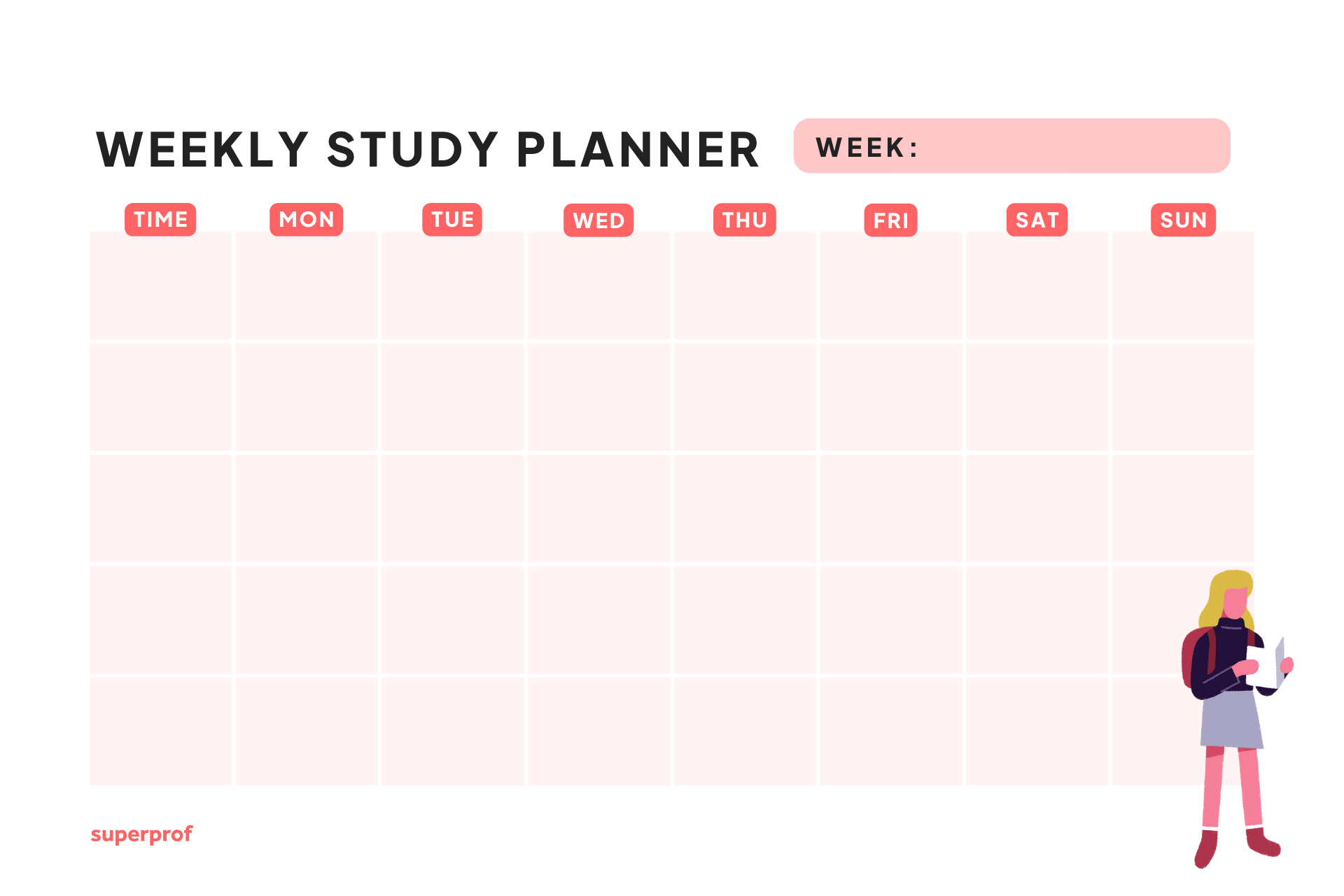With multiple subjects, tight deadlines, and the pressure to perform well, the Leaving Cert can feel overwhelming. However, success is about working smart, not hard.
With a clear study plan, the right tools, and proven strategies, you can take control of your time, reduce stress, and boost your results.

Start with a Study Plan Template
Before you do anything, make a plan. A structured template should help you break your goals into manageable tasks and visualise your week.
Download our free study plan to start the process.

Create space to track subjects, time slots, and even your breaks. A study plan is a broader overview of your learning strategy.
There isn't any magic solution to creating a study plan, and you don't need to reinvent the wheel. Instead, focus on manageable scheduling, regular breaks, and studying little and often rather than trying to cram once or twice a week.
Print your weekly planner and stick it somewhere visible, like your wall, inside your locker, or at your study desk. It'll keep your priorities front and centre every day.
Block out dedicated study hours for each subject, including downtime, review sessions, and mock exam practice.
A routine will keep you accountable and avoid last-minute cramming. Over time, you won't need to look that often as your planner since it'll be a habit.
Why a Study Plan Is Essential for Leaving Cert Success
Think of your study plan as your personal roadmap to success. It's not just a schedule; it outlines what you need to do and when so that you'll always be on track.
Without a study plan, you can easily fall behind, get overwhelmed, or spend too much time on one subject.
With Leaving Cert students juggling up to nine subjects, it can be easy to neglect one or two, especially with only seven days a week!
With a study plan, you can use your time effectively, stay focused on goals, and never have to figure out what to study each day, as it'll be in your study plan.
A study plan will help you stay balanced, too. It allows you to study while remembering things like sleep, meals, hobbies, and social activities. In fact, your study plan will help you as much with your studies as it will with everything else you have to do.

Your plan will also help you be better prepared for any Leaving Cert adjustments that may occur.
How to Structure Your Week for Maximum Impact
As we've seen, there are up to nine subjects and only seven days to study them. So, how can you structure your week to balance school, study, and life?
completion rate.
Start with your class schedule and fixed commitments, such as sports or extracurricular activities. Since these can't be moved around, you must accommodate them.
In your free time, schedule focused study sessions for each subject. 25-50-minute sessions with short breaks are recommended.
You must also schedule review and consolidation time, particularly on the weekends. Sundays are suitable for light revision, planning for the next week, or doing a timed past paper or mock exam.
50% of your weekly study time should go to core subjects (English, Irish, Maths), 30% to exam-heavy subjects, and 20% to practical subjects or electives.
Remember that different subjects have different strategies and that you should leave some time open for rest, hobbies, and even a little mental break.
Creating Goals That Actually Help You Learn
Your study plan must have a purpose. Without clear goals, you'll end up doing busy work, which will waste your time and energy.

Start by identifying what you need from each subject. We recommend setting SMART goals: Specific, Measurable, Achievable, Relevant, and Time-bound.
This could be something like "Complete three exam-style questions for biology each week" or "Revise key business definitions for 15 minutes a day".
Break bigger goals into monthly targets and daily to-dos (the time-bound part of SMART). By mixing the big picture and manageable short-term goals, you can stay far more motivated.
If you're unsure where to start, look at your Leaving Cert timetable. This will also help you know when your exams will be and when you need to have finished revising for each subject.

Using Your Textbooks the Right Way
Textbooks might not seem as important now that we have computers and the Internet, but they're probably one of the most powerful tools in your Leaving Cert revision toolkit.

After all, these contain the syllabus and exam-relevant information and tend to mirror how each subject is assessed.
You should read chapters with a purpose. Don't scan pages until you've fully read a chapter. Look to highlight key points, write margin notes, and regularly test your understanding by asking yourself questions as you go.
Break a chapter into smaller chunks across multiple study sessions when it feels overwhelming.
There isn't a right way to read textbooks since every student is different. Some students prefer reading quickly, while others prefer reading little and often. Look for approaches that keep you engaged.
Read a textbook chapter once without making notes. Then, go back with a pen and notebook to write down the most essential points.
Don't forget that your revision schedule should also consider the CAO application timeline and any other time-dependent commitments you have both in and out of school.
How to Take Better Notes and Use Them
Good notes do more than summarise information. They should help you actively engage with what you're learning by supporting memory, improving understanding, and giving you a clear resource to revise both before and during exam season.
Keep your notes concise and structured. Chapters can be summarised into 3 or 4 pages, focusing on the core ideas rather than simply rewriting entire paragraphs.
You can help with bullet points, headings, diagrams, or mind maps. Look for approaches that suit your learning style.
Creative learners benefit from visual notes and diagrams. Logical learners often prefer structured outlines. Try different formats to see what works best for you.
Be sure to highlight or underline essential facts, definitions, and formulae. Colour-coding notes can also help organise topics and make revision more engaging.
Your subject choices will also affect how you study, as certain subjects lend themselves better to different revision techniques.
Flashcards, Apps, and Study Tools That Work
Flashcards are an effective tool for boosting memory. Students can retain more information over time with them, especially in subjects that require definitions, formulae, quotes, or key facts.
Create your own flashcards, as they can also aid memory. When you write or create a flashcard, you actively engage with the material.
2 to 3 cards per textbook chapter should help, provided you keep them clear and concise.
Students using flashcards alongside digital tools like spaced repetition apps often report better focus and exam performance, mainly when they review daily in short sessions.
You can also use apps to organise tasks and notes that you can integrate into your study strategies.
Practice Makes Perfect: How to Use Past Papers Effectively
While you're revising for a given study, you're actually really revising for the exam itself. You're not specifically being tested on the subject but rather your ability to pass that subject's exam.

This is why even if you know all the material inside out, you should be familiar with the exam. You need to know how to answer exam-style questions and give the examiners exactly what they want.
Provided they're still relevant, we recommend downloading the last 3-5 years of exams for each subject to work through.
When you use a past paper or mock exam, replicate exam conditions as closely as possible.
You can also look to the official mark schemes to check your answers when you've finished. Not only will this allow you to see how you've done, but you'll also get an insight into how examiners think.
By the way, this is also something you can do during your junior cert and any other types of exams!
Find Support: How a Tutor Can Help You Level Up
If you're struggling to create your Leaving Cert study plan or your sessions aren't as effective as you'd like them to be, enlist the help of a private tutor.
They can work with you to form better study habits or even work with you during your sessions.
You can find revision or subject-specific tutors by searching the Superprof website!
With many tutors offering their first session for free, you can even try a few potential tutors before choosing the one that's right for you.
Summarise with AI:











